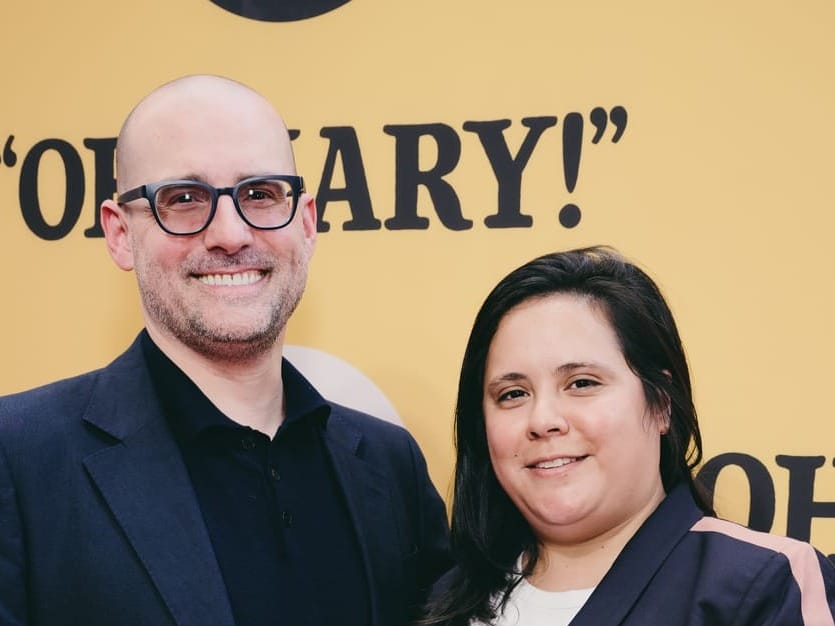Sometimes on Broadway, you have to mobilize quickly.
Take producer Jeffrey Chrzczon. He scored a prime Broadway theater, the Imperial, for his new Christmas-themed show — but he landed the venue in late September, giving him less than 12 weeks to create and produce “Ruben & Clay’s First Annual Christmas Carol Family Fun Pageant Spectacular Reunion Show” before it begins performances Dec. 7.
That’s fast. But having secured Clay Aiken and Ruben Studdard, two of the bigger “American Idol” names from the TV competition’s most popular years, the producing team had prepped for the last-minute eventuality by laying the creative groundwork over the summer. It was a risk, but one that Chrzczon took happily.
“No matter what, the holidays are the highest-selling time of year for theater and for entertainment in New York City,” Chrzczon said. “I know that a Christmas show will work.”
His confidence might surprise those who remember that the producer’s most recent Christmas-themed outing on Broadway, last year’s “Home for the Holidays,” floundered at the box office, bringing in less than $100,000 for each of the seven weeks it played the August Wilson Theatre. But that hasn’t scared away Chrzczon, or anyone else: This month alone, three separate shows — “Ruben & Clay,” “The Illusionists: Magic of the Holidays” and “Celebrity Autobiography” — are playing short holiday runs.
That’s because more and more producers are seeing potential in a venue’s dark weeks as Broadway’s profile soars in the wake of “Hamilton’s” success. And despite some notable disappointments and a complicated mix of economic and practical hurdles, these interim bookings can, when the math works out, turn into a win-win proposition for producers and theater owners alike.
For landlords, the benefits add up to more than just a couple more rent checks. “It’s also a win for all of the people who work at the theater who would otherwise be out of work,” said Jujamcyn Theaters president Jordan Roth. “For all of those people, having two, three, four more lit weeks is really meaningful. That’s a huge part of our responsibility as theater owners.”
From the theater owner’s perspective, the main criteria for an interim booking, according to industry executives, is viability: a production’s likelihood to attract Broadway audiences, and, perhaps even more importantly, its producers’ ability to raise the capital. “You say, ‘Who has the money, and who can make it happen?’” said one insider.
The holidays have become the pocket of time that theater owners seem most likely to have a Broadway venue temporarily vacant, as fading shows throw in the towel after Labor Day and landlords line up big bookings for the spring. But in general, Broadway’s ultra-tight real estate market has made it hard to bet on the exact timing of any availabilities.
At the same time, producers face the daunting challenge of turning a profit in even less time than the limited-run, star-driven plays that stick around 16 to 20 weeks.
The strategy is to think beyond Broadway. “The Illusionists,” the series of magic shows with a rotating cast of magicians and acts, has played a holiday slot on Broadway for four of the last five holiday seasons. The show’s producing team, including U.S. producer-promoter MagicSpace Entertainment, sees Broadway as an important stateside launchpad for a show that originated in Sydney.
“The only way I wanted to do it in North America was if we branded it on Broadway first, and then we could tour it on Broadway subscription series throughout the United States,” said Lee D. Marshall of MagicSpace.
Since then the show has found success by targeting its marketing toward men and children, rather than the traditional Broadway ticket-buying demo of older women.
“We’re advertising in football games, and Broadway shows don’t do that,” Marshall said.
In the first two weeks of this year’s run at the Marquis Theatre, “The Illusionists” grossed $1.85 million over fifteen performances, significantly more than the first two weeks of its most recent prior run in 2016.
MagicSpace is also behind the three Monday night performances of “Celebrity Autobiography” at the Marquis — a dark-night run that MagicSpace’s Steve Boulay hopes will boost that project’s profile enough to lead to a longer Broadway run, a life on the road or some combination of both.
There are significant overtime costs involved in keeping a venue staffed seven days a week, but “Autobiography” backers were able to make a special deal with Local One, Actors’ Equity and the theater owners in tandem with their pact for “The Illusionists.”
“Any other stand-alone approach to putting the show on a Broadway stage for such a short run would simply have been too cost prohibitive to consider,” Boulay said.
Meanwhile, the Broadway run of “Ruben and Clay” represents the first year of a three-year deal that will see the show hit the road for the next two seasons.
“The tour’s already being sold,” Chrzczon noted. “We have dates scheduled for the second week of November next year.”
Capitalization costs were kept below the $2 million mark. “You approach it as a huge concert instead of a small Broadway show,” he said of the financial model, adding that the show has the potential to recoup with the New York run alone, should things go well.
Chrzczon also has the advantage of the lessons learned the hard way with last year’s “Home for the Holidays” — including the fact that massive social media followings don’t always translate to Broadway sales. He remains so bullish on this year’s project, it seemed only natural to ask if he’s got any holidays shows brewing for next year.
“Not yet,” he answered with a laugh. “But don’t count us out!”


























































